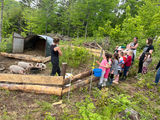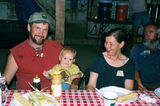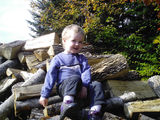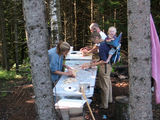

More About Earthwise Farm and Forest
Earthwise Farm and Forest - The story of Lisa & Carl and their humble beginnings
By Carl Russell - This article was published in the Spring 2013 Edition of The Draft Horse Connection
The intimacy of being physically involved in creating the impact of land-use cultivates a feeling of responsibility. Whether it is the caress of our hands on animals as we accustom them to our working relationships, the call of a raven as we skid logs out of the woods, or the odor of freshly turned soil as it slides across the face of a plow, these things draw us physically into relationships with the Life around us. We are drawn closer to the Earth, and therefore more interested in direct participation with the system that we depend on for the sustenance of our family. This is the foundation for our philosophy on stewardship, and the use of draft animal power is integral to it.
My wife Lisa McCrory and I operate Earthwise Farm and Forest, a certified Organic draft-animal powered diversified family farm located on 150 acres in Bethel, Vermont. We produce and sell certified Organic garlic, potatoes, raw milk, flowers, herbs, perennials, and poultry (chicken and heritage turkey). We also sell gmo-free eggs and pork that are raised organically, but not certified. We use forest management principles that maintain ecological integrity, and use our draft animals exclusively to harvest logs that we sell as custom-cut lumber and fuelwood.
Approximately 125 acres are actively managed forest of varying species composition, from northern hardwoods to mixed softwoods, and used to produce fuelwood, sawtimber, maple syrup, and to provide ecological services and recreational opportunities. All of the forestry work conducted in these areas has been done exclusively using draft horses and oxen since 1986. Thirty acres of forest plantations have been dedicated to conversion into pasture and crop land, and we lease an additional 25 acres from neighbors for pasture.
The emphasis of our farming enterprise is to function as a self-sufficient 'whole farm organism', applying ecological principles, biodynamics, dowsing, draft-animal power, and renewable energy to create healthy vibrant food and forest products for our family, and our local community. Everything on our farm is raised using a process of intention and intuition to validate the unseen energy of Life's creative process. The name of our farm points to our belief in the inherent wisdom of established processes of the Earth, and that as we work to secure what we need from the land, we also need to validate those processes as our most valuable resources.
We have come to understand that information and practices learned through application are some of the most valuable products that land stewards can provide to our communities. On our farm Lisa and I put into practice many of the skills and methods that we recommend to others through our forestry and agricultural consulting businesses. We also offer a number of on-farm workshops on topics including: Raw Dairy Processing, Management Intensive Grazing, Caring for your Family Cow, Dowsing in Agriculture, On-Farm Slaughter, Introduction to Draft Animals, Horse-logging, Ecological Forestry, and Designing and Operating an Off-Grid Home and Farmstead. On other occasions, we travel to speak and teach at conferences and workshops throughout the Northeast, covering similar topics.
The property where we farm has been in our family since 1938, when my Grandfather bought it in the hopes that he would be able to rehabilitate it into a working farm in his retirement. By the mid 1950’s his health was failing, so in the interest of conservation, he planted the 30 acres of open land with softwood timber species. Throughout my youth our family grew large annual gardens and cut fuelwood, but my parents had professional careers that helped them to maintain ownership of the property. It wasn’t until 1986 when I bought a draft horse for my logging business that my life-long dream of working the land started to take shape.
In 2000 Lisa and I met at a kitchen meeting that she was hosting about GMO seed and food products. Her background in grazing, Organic dairy farming, and dowsing, and her interests in advocacy and education created a natural commonality that connected us almost immediately.
After we married in 2001, our first project was to build a house so that we could move to this land while my mother could remain in her home. Through the process of Holistic Management, we created a vision for our future that has at its foundation an adherence to intuitive processes, and the recognition that value comes into our lives in many personal ways. One of my long-term objectives has been to use my own skills and resources to provide for my family, so it became clear that we would design and build our own home, using material harvested from our own land with our draft horses.
It took 3½ years to complete, working mostly alone with a few intermittent assistants, from clearing the site to the day we moved in, but the result is an eight-sided scribed-log home with cellar and two floors. To match our objectives of living within the means of our own resources, the home is powered with a small array of photo-voltaic panels and a wind turbine, connected to a battery bank and inverter. We heat exclusively with wood, which includes hot water in the winter. In the summer our water is heated by another set of solar collectors. When we sited the home we hired a dowser-friend to locate a well that would provide a gravity-fed water source that now delivers adequate pressure for all household uses.
One of the major challenges that our culture faces as we consider our energy needs for our homes and land-use enterprises is how to manage consumption. We have found that conservation is most attainable through a thorough process of evaluating resiliency. Many of the systems that we incorporate in our home and on our farm are labor intensive, and require our attention to be effective, but they can operate with minimal financial, technical, or energy inputs. We also try to make our systems multi-faceted, like our composting toilets, which reduce our water consumption, recapture nutrients, require no electricity for a water pump, and protect ground water by eliminating a septic system.
Working with draft animals is another way we address energy consumption in our lives. While draft animals obviously provide motive power with minimal consumption of resources, the time required for human physical labor, the low rate of production, and the limited power of animals create logistical restrictions on the type of work that can be legitimately considered. Although high production and maximum utilization have become conventional standards, we do not consider them to be necessary components of successful land stewardship.
Success with draft animals starts with being realistic about what they can do, but it isn’t just a simple matter of putting horses into a system in place of a tractor. It really comes down to thinking in broader terms about the multitude of expected results from any enterprise, and how they can be realized with the least amount of inputs. Rotational pasturing of livestock instead of spreading manure is a simple example. Providing a substantial portion of annual income from forest products is another, given that the forest is the natural ecological condition in our region. We try to find ways that we can use natural systems that are already functioning around us, so that we reduce the required amount of work to accomplish the task.
The drawbacks of draft animals are related to experience and expectation. Learning how to care for them, and what to expect from them is all about time, time, and more time. It is continuous, laborious, slow work, with low cash flow. But, it is very satisfying, and it puts into perspective what we are losing as a planet and as a species by developing technologies that turn life into quick easy projects. By using draft animals as our primary power, we lay hands on so many aspects of our own lives.
We believe that our farming practices should not only nourish our bodies with food, but that they should be enhancing, protecting, and investing in the soil and biological communities that make up our farm environment. Many of our methods are labor intensive, which means that we can have a personal, intimate, and focused relationship with our food system, but it also means that we are limited in the use of economies of scale that could reduce costs. By being honest about these costs, and educating consumers about their role in making thoughtful practices cost-effective, we can build a food system that shifts the emphasis from cost-based profitability, to one that is based on knowledge and responsibility.
Lisa and I decided years ago that we wanted to have access to food that didn’t compromise our principles about health, the environment, economics, and social beliefs. We didn’t want to take part in a food system that deprived farmers of fair wages, robbed land of nutrients, destroyed ecosystems, denatured food through processing, degraded animals to undignified widgets, and limited, through regulation, how we sourced our food.
Every year we fill our freezers, pantry, and root cellar, and in turn our plates, with fresh home-raised food grown with limited inputs. The milk on our farm is squeezed by hand from our cows tethered at pasture’s edge, and we use it unpasteurized, to drink, and to make cheese, butter, and yogurt. We eat meat from animals that we have handled since birth, raised with dignity, and slaughtered with our own hands, right where they lived. We grow our vegetables in soil that has been cultivated for 26 years using hand and horse-power only, and we cycle a variety of excess organic matter into animal feed, and compost it with manure for our primary nutrient inputs.
Through farming we maintain the human connection to nature. It puts us in direct contact with our next meal. This is why the techniques of farming by hand and with draft animals are such valuable crafts. A large tractor may turn a lot of soil into a lot of corn, but it does little to encourage the human connection to nature. In nature there is no profit or loss, only cycles. Farming has to be about more than financial profitability if natural cycles are to be respected.
Farming in the 21st century should not be just about profitability, or affordability, it should also be about responsibility. The need to be profitable based on production has fished away the fish, plowed away the soil, and deforested landscapes all over the world, and we have created huge ecological deficits. Being responsible for cultivating a livelihood within the parameters of our local ecosystem, and exposing people to the art of using the underlying knowledge, is how we measure success at Earthwise Farm and Forest. A physical Life is an artistic expression. Living is an art. As we free ourselves through creative physical endeavor, we validate the similar efforts and contributions of our families and neighbors. As we contribute to our family and community with the physical skills and limitations that are the result of our own life experience we truly fulfill our human potential.













